Culturally Sensitive Counselling: A Case Study on Diversity Issues
VerifiedAdded on 2023/06/10
|10
|2955
|77
Case Study
AI Summary
This case study examines the counselling needs of Hana, a client from a linguistically and culturally diverse background, who is experiencing anxiety, loneliness, and sadness due to the loss of her parents and the inability to travel back to Kenya. The counsellor must adopt a culturally sensitive approach to enhance Hana's mental health, addressing her emotional needs and stress factors while adhering to social and ecological rules. The approach should provide methods for improving her psychological well-being, considering the diversity issues within the field of counselling and acknowledging individual differences. Cultural competence, humility, and adaptability are crucial for building a working alliance with Hana, reducing the distance between counsellor and client. The study also discusses the clinical and ethical implications of adopting a culturally sensitive approach, highlighting the importance of cultural awareness and the need to address potential biases in counselling. The use of mental health services among those from CALD backgrounds remains a problem that needs to be addressed.

Cover Page
Paraphrase This Document
Need a fresh take? Get an instant paraphrase of this document with our AI Paraphraser
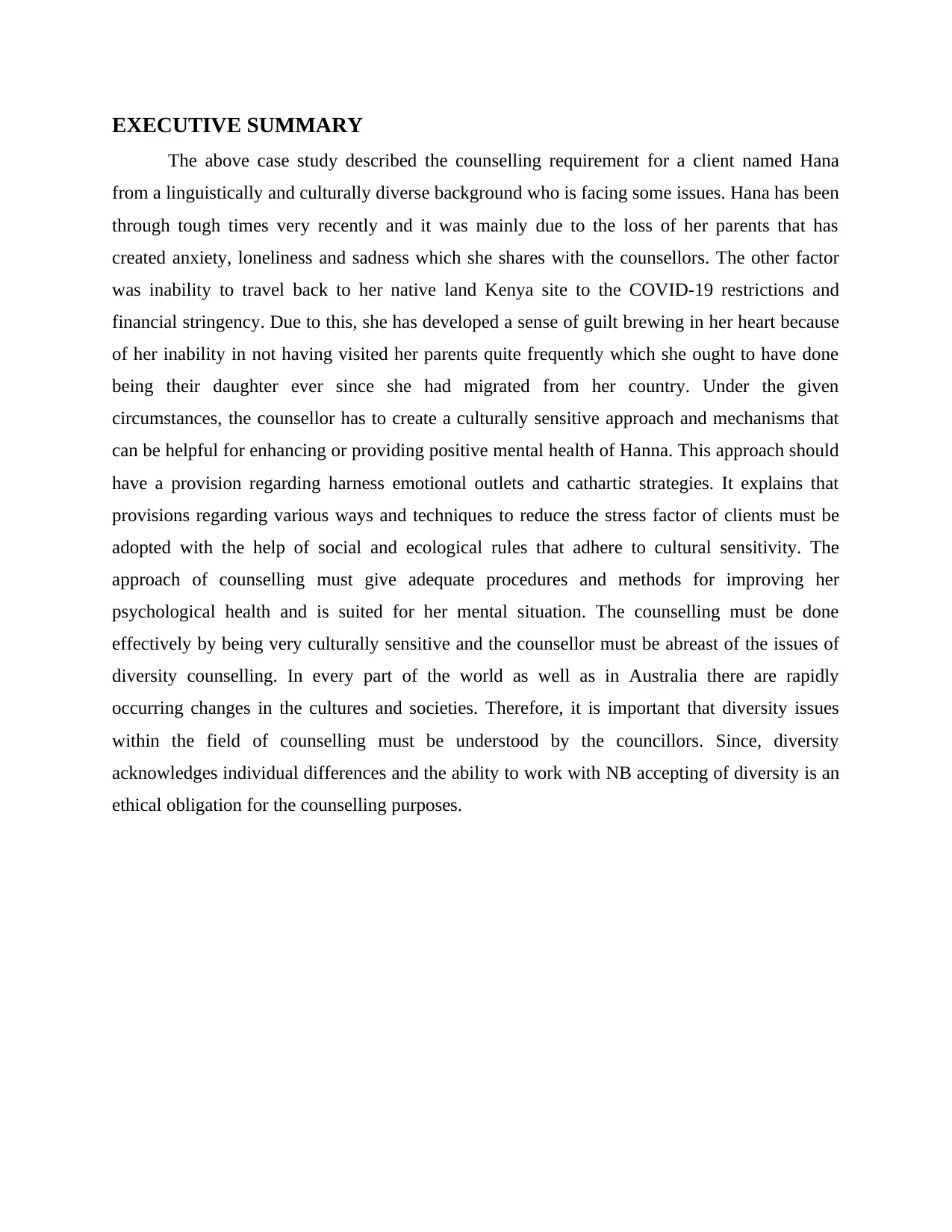
EXECUTIVE SUMMARY
The above case study described the counselling requirement for a client named Hana
from a linguistically and culturally diverse background who is facing some issues. Hana has been
through tough times very recently and it was mainly due to the loss of her parents that has
created anxiety, loneliness and sadness which she shares with the counsellors. The other factor
was inability to travel back to her native land Kenya site to the COVID-19 restrictions and
financial stringency. Due to this, she has developed a sense of guilt brewing in her heart because
of her inability in not having visited her parents quite frequently which she ought to have done
being their daughter ever since she had migrated from her country. Under the given
circumstances, the counsellor has to create a culturally sensitive approach and mechanisms that
can be helpful for enhancing or providing positive mental health of Hanna. This approach should
have a provision regarding harness emotional outlets and cathartic strategies. It explains that
provisions regarding various ways and techniques to reduce the stress factor of clients must be
adopted with the help of social and ecological rules that adhere to cultural sensitivity. The
approach of counselling must give adequate procedures and methods for improving her
psychological health and is suited for her mental situation. The counselling must be done
effectively by being very culturally sensitive and the counsellor must be abreast of the issues of
diversity counselling. In every part of the world as well as in Australia there are rapidly
occurring changes in the cultures and societies. Therefore, it is important that diversity issues
within the field of counselling must be understood by the councillors. Since, diversity
acknowledges individual differences and the ability to work with NB accepting of diversity is an
ethical obligation for the counselling purposes.
The above case study described the counselling requirement for a client named Hana
from a linguistically and culturally diverse background who is facing some issues. Hana has been
through tough times very recently and it was mainly due to the loss of her parents that has
created anxiety, loneliness and sadness which she shares with the counsellors. The other factor
was inability to travel back to her native land Kenya site to the COVID-19 restrictions and
financial stringency. Due to this, she has developed a sense of guilt brewing in her heart because
of her inability in not having visited her parents quite frequently which she ought to have done
being their daughter ever since she had migrated from her country. Under the given
circumstances, the counsellor has to create a culturally sensitive approach and mechanisms that
can be helpful for enhancing or providing positive mental health of Hanna. This approach should
have a provision regarding harness emotional outlets and cathartic strategies. It explains that
provisions regarding various ways and techniques to reduce the stress factor of clients must be
adopted with the help of social and ecological rules that adhere to cultural sensitivity. The
approach of counselling must give adequate procedures and methods for improving her
psychological health and is suited for her mental situation. The counselling must be done
effectively by being very culturally sensitive and the counsellor must be abreast of the issues of
diversity counselling. In every part of the world as well as in Australia there are rapidly
occurring changes in the cultures and societies. Therefore, it is important that diversity issues
within the field of counselling must be understood by the councillors. Since, diversity
acknowledges individual differences and the ability to work with NB accepting of diversity is an
ethical obligation for the counselling purposes.
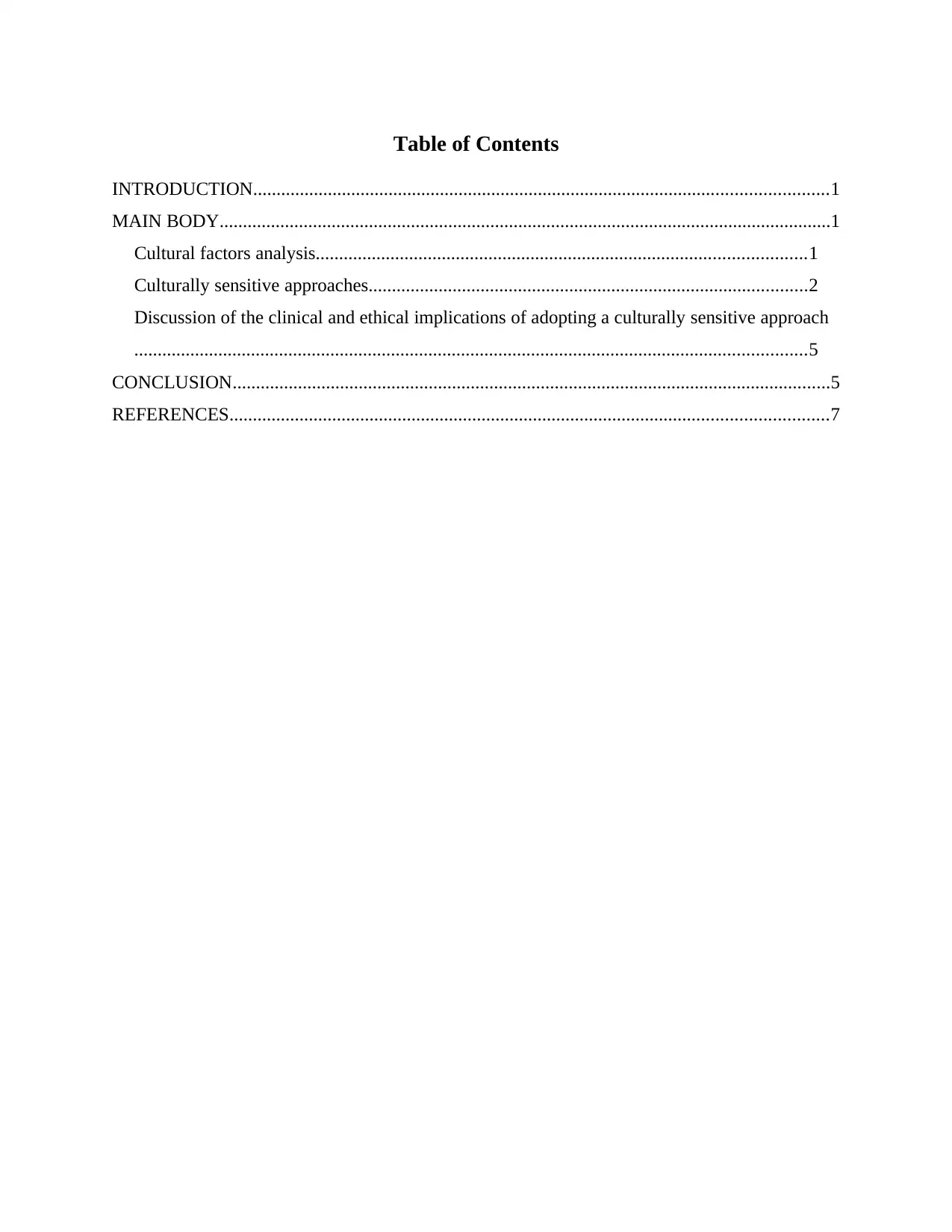
Table of Contents
INTRODUCTION...........................................................................................................................1
MAIN BODY...................................................................................................................................1
Cultural factors analysis.........................................................................................................1
Culturally sensitive approaches..............................................................................................2
Discussion of the clinical and ethical implications of adopting a culturally sensitive approach
................................................................................................................................................5
CONCLUSION................................................................................................................................5
REFERENCES................................................................................................................................7
INTRODUCTION...........................................................................................................................1
MAIN BODY...................................................................................................................................1
Cultural factors analysis.........................................................................................................1
Culturally sensitive approaches..............................................................................................2
Discussion of the clinical and ethical implications of adopting a culturally sensitive approach
................................................................................................................................................5
CONCLUSION................................................................................................................................5
REFERENCES................................................................................................................................7
⊘ This is a preview!⊘
Do you want full access?
Subscribe today to unlock all pages.

Trusted by 1+ million students worldwide
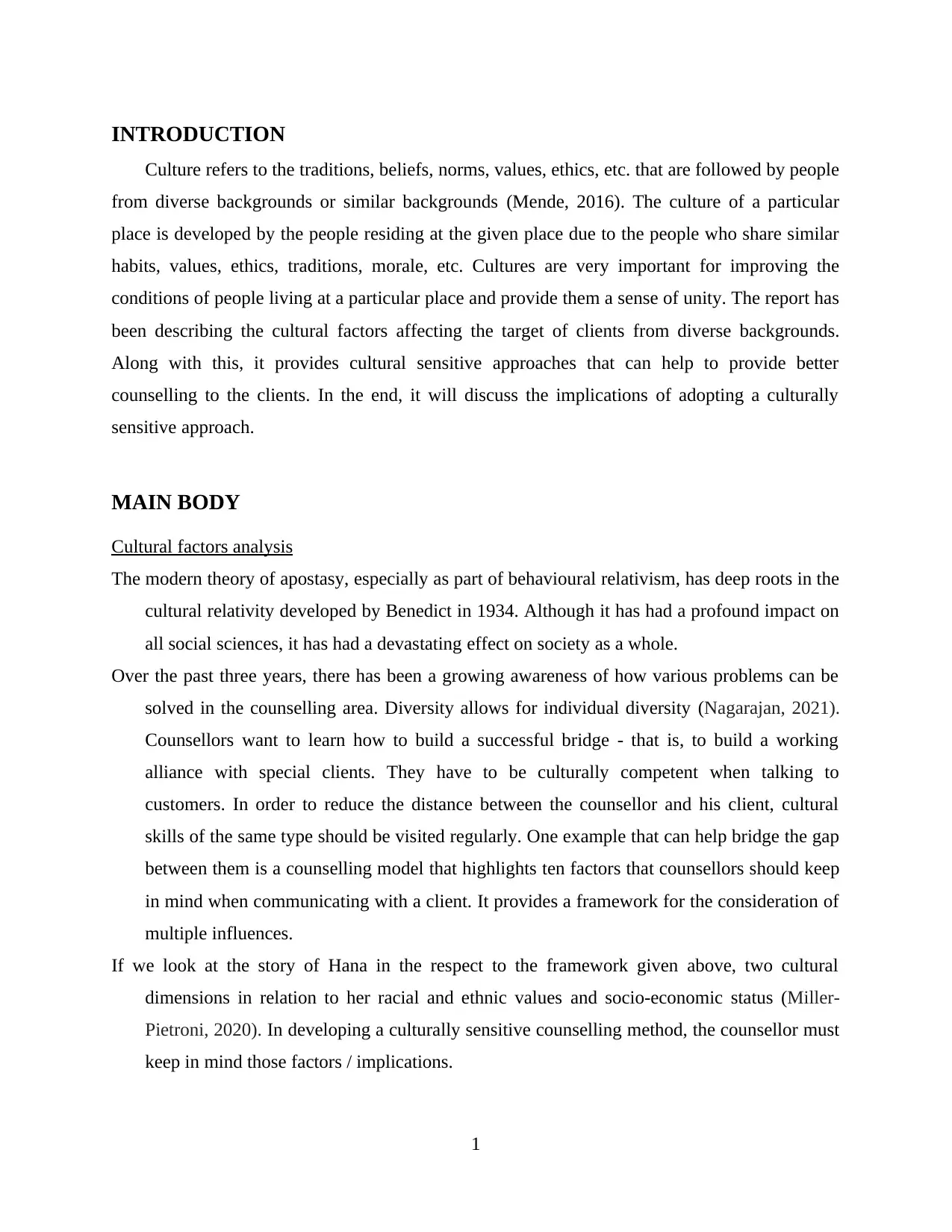
INTRODUCTION
Culture refers to the traditions, beliefs, norms, values, ethics, etc. that are followed by people
from diverse backgrounds or similar backgrounds (Mende, 2016). The culture of a particular
place is developed by the people residing at the given place due to the people who share similar
habits, values, ethics, traditions, morale, etc. Cultures are very important for improving the
conditions of people living at a particular place and provide them a sense of unity. The report has
been describing the cultural factors affecting the target of clients from diverse backgrounds.
Along with this, it provides cultural sensitive approaches that can help to provide better
counselling to the clients. In the end, it will discuss the implications of adopting a culturally
sensitive approach.
MAIN BODY
Cultural factors analysis
The modern theory of apostasy, especially as part of behavioural relativism, has deep roots in the
cultural relativity developed by Benedict in 1934. Although it has had a profound impact on
all social sciences, it has had a devastating effect on society as a whole.
Over the past three years, there has been a growing awareness of how various problems can be
solved in the counselling area. Diversity allows for individual diversity (Nagarajan, 2021).
Counsellors want to learn how to build a successful bridge - that is, to build a working
alliance with special clients. They have to be culturally competent when talking to
customers. In order to reduce the distance between the counsellor and his client, cultural
skills of the same type should be visited regularly. One example that can help bridge the gap
between them is a counselling model that highlights ten factors that counsellors should keep
in mind when communicating with a client. It provides a framework for the consideration of
multiple influences.
If we look at the story of Hana in the respect to the framework given above, two cultural
dimensions in relation to her racial and ethnic values and socio-economic status (Miller-
Pietroni, 2020). In developing a culturally sensitive counselling method, the counsellor must
keep in mind those factors / implications.
1
Culture refers to the traditions, beliefs, norms, values, ethics, etc. that are followed by people
from diverse backgrounds or similar backgrounds (Mende, 2016). The culture of a particular
place is developed by the people residing at the given place due to the people who share similar
habits, values, ethics, traditions, morale, etc. Cultures are very important for improving the
conditions of people living at a particular place and provide them a sense of unity. The report has
been describing the cultural factors affecting the target of clients from diverse backgrounds.
Along with this, it provides cultural sensitive approaches that can help to provide better
counselling to the clients. In the end, it will discuss the implications of adopting a culturally
sensitive approach.
MAIN BODY
Cultural factors analysis
The modern theory of apostasy, especially as part of behavioural relativism, has deep roots in the
cultural relativity developed by Benedict in 1934. Although it has had a profound impact on
all social sciences, it has had a devastating effect on society as a whole.
Over the past three years, there has been a growing awareness of how various problems can be
solved in the counselling area. Diversity allows for individual diversity (Nagarajan, 2021).
Counsellors want to learn how to build a successful bridge - that is, to build a working
alliance with special clients. They have to be culturally competent when talking to
customers. In order to reduce the distance between the counsellor and his client, cultural
skills of the same type should be visited regularly. One example that can help bridge the gap
between them is a counselling model that highlights ten factors that counsellors should keep
in mind when communicating with a client. It provides a framework for the consideration of
multiple influences.
If we look at the story of Hana in the respect to the framework given above, two cultural
dimensions in relation to her racial and ethnic values and socio-economic status (Miller-
Pietroni, 2020). In developing a culturally sensitive counselling method, the counsellor must
keep in mind those factors / implications.
1
Paraphrase This Document
Need a fresh take? Get an instant paraphrase of this document with our AI Paraphraser
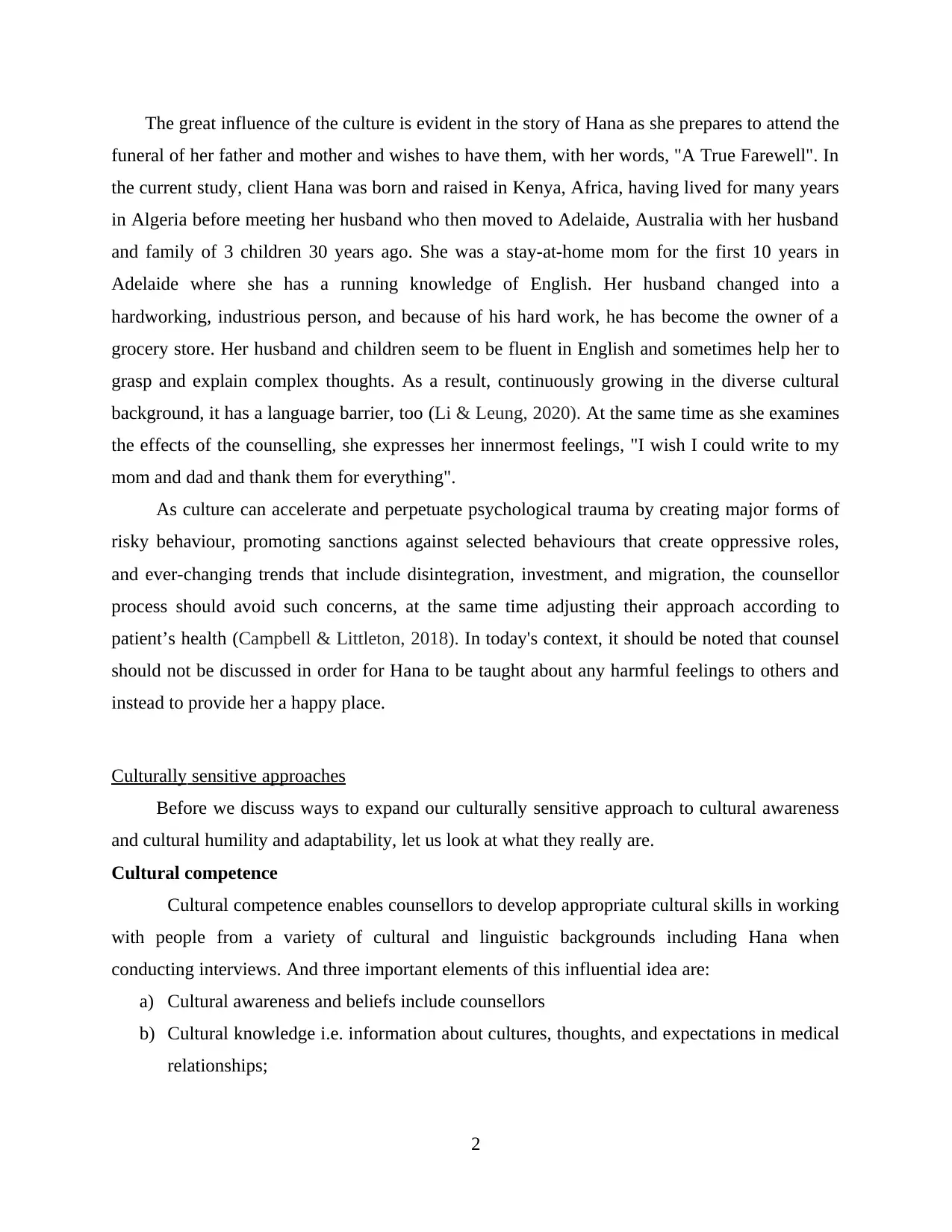
The great influence of the culture is evident in the story of Hana as she prepares to attend the
funeral of her father and mother and wishes to have them, with her words, "A True Farewell". In
the current study, client Hana was born and raised in Kenya, Africa, having lived for many years
in Algeria before meeting her husband who then moved to Adelaide, Australia with her husband
and family of 3 children 30 years ago. She was a stay-at-home mom for the first 10 years in
Adelaide where she has a running knowledge of English. Her husband changed into a
hardworking, industrious person, and because of his hard work, he has become the owner of a
grocery store. Her husband and children seem to be fluent in English and sometimes help her to
grasp and explain complex thoughts. As a result, continuously growing in the diverse cultural
background, it has a language barrier, too (Li & Leung, 2020). At the same time as she examines
the effects of the counselling, she expresses her innermost feelings, "I wish I could write to my
mom and dad and thank them for everything".
As culture can accelerate and perpetuate psychological trauma by creating major forms of
risky behaviour, promoting sanctions against selected behaviours that create oppressive roles,
and ever-changing trends that include disintegration, investment, and migration, the counsellor
process should avoid such concerns, at the same time adjusting their approach according to
patient’s health (Campbell & Littleton, 2018). In today's context, it should be noted that counsel
should not be discussed in order for Hana to be taught about any harmful feelings to others and
instead to provide her a happy place.
Culturally sensitive approaches
Before we discuss ways to expand our culturally sensitive approach to cultural awareness
and cultural humility and adaptability, let us look at what they really are.
Cultural competence
Cultural competence enables counsellors to develop appropriate cultural skills in working
with people from a variety of cultural and linguistic backgrounds including Hana when
conducting interviews. And three important elements of this influential idea are:
a) Cultural awareness and beliefs include counsellors
b) Cultural knowledge i.e. information about cultures, thoughts, and expectations in medical
relationships;
2
funeral of her father and mother and wishes to have them, with her words, "A True Farewell". In
the current study, client Hana was born and raised in Kenya, Africa, having lived for many years
in Algeria before meeting her husband who then moved to Adelaide, Australia with her husband
and family of 3 children 30 years ago. She was a stay-at-home mom for the first 10 years in
Adelaide where she has a running knowledge of English. Her husband changed into a
hardworking, industrious person, and because of his hard work, he has become the owner of a
grocery store. Her husband and children seem to be fluent in English and sometimes help her to
grasp and explain complex thoughts. As a result, continuously growing in the diverse cultural
background, it has a language barrier, too (Li & Leung, 2020). At the same time as she examines
the effects of the counselling, she expresses her innermost feelings, "I wish I could write to my
mom and dad and thank them for everything".
As culture can accelerate and perpetuate psychological trauma by creating major forms of
risky behaviour, promoting sanctions against selected behaviours that create oppressive roles,
and ever-changing trends that include disintegration, investment, and migration, the counsellor
process should avoid such concerns, at the same time adjusting their approach according to
patient’s health (Campbell & Littleton, 2018). In today's context, it should be noted that counsel
should not be discussed in order for Hana to be taught about any harmful feelings to others and
instead to provide her a happy place.
Culturally sensitive approaches
Before we discuss ways to expand our culturally sensitive approach to cultural awareness
and cultural humility and adaptability, let us look at what they really are.
Cultural competence
Cultural competence enables counsellors to develop appropriate cultural skills in working
with people from a variety of cultural and linguistic backgrounds including Hana when
conducting interviews. And three important elements of this influential idea are:
a) Cultural awareness and beliefs include counsellors
b) Cultural knowledge i.e. information about cultures, thoughts, and expectations in medical
relationships;
2
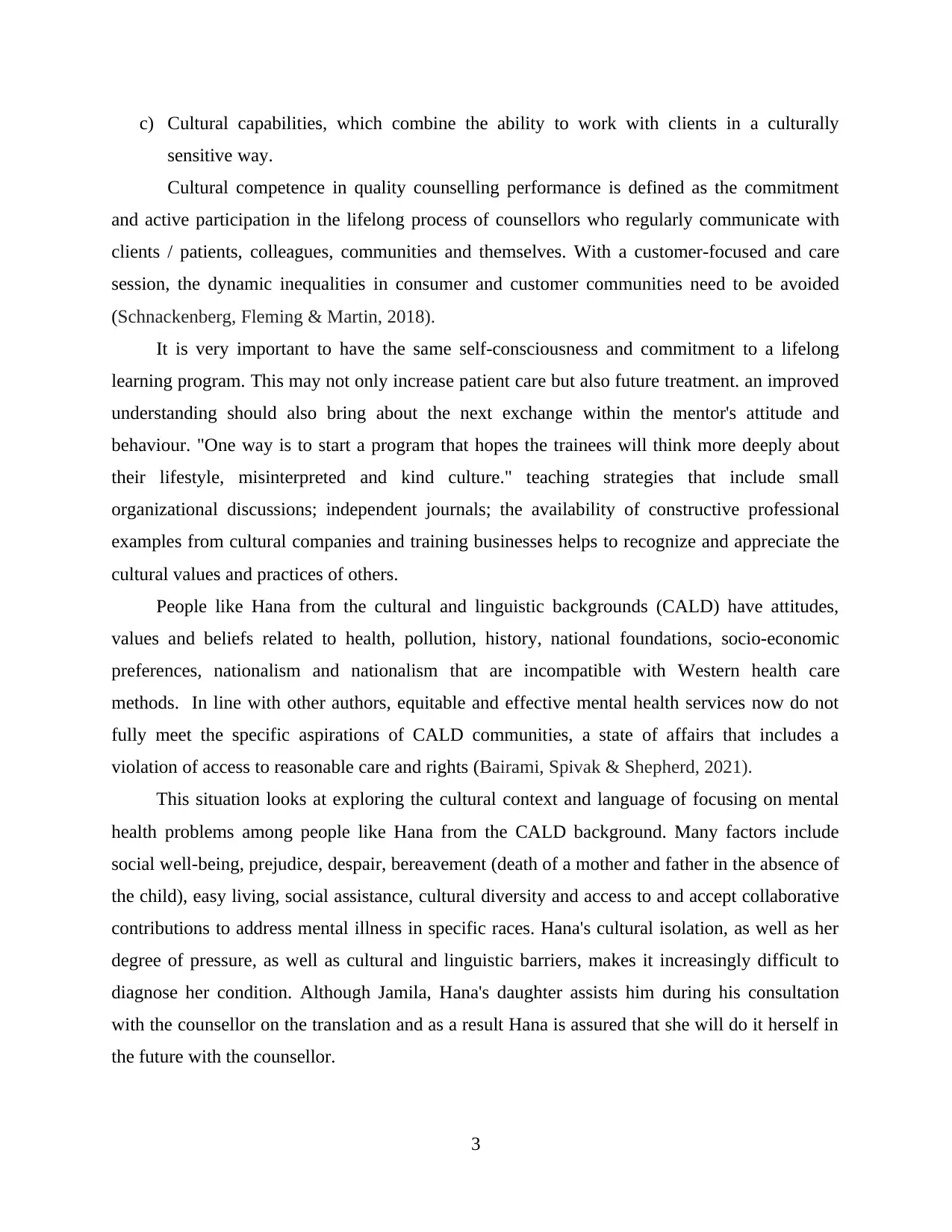
c) Cultural capabilities, which combine the ability to work with clients in a culturally
sensitive way.
Cultural competence in quality counselling performance is defined as the commitment
and active participation in the lifelong process of counsellors who regularly communicate with
clients / patients, colleagues, communities and themselves. With a customer-focused and care
session, the dynamic inequalities in consumer and customer communities need to be avoided
(Schnackenberg, Fleming & Martin, 2018).
It is very important to have the same self-consciousness and commitment to a lifelong
learning program. This may not only increase patient care but also future treatment. an improved
understanding should also bring about the next exchange within the mentor's attitude and
behaviour. "One way is to start a program that hopes the trainees will think more deeply about
their lifestyle, misinterpreted and kind culture." teaching strategies that include small
organizational discussions; independent journals; the availability of constructive professional
examples from cultural companies and training businesses helps to recognize and appreciate the
cultural values and practices of others.
People like Hana from the cultural and linguistic backgrounds (CALD) have attitudes,
values and beliefs related to health, pollution, history, national foundations, socio-economic
preferences, nationalism and nationalism that are incompatible with Western health care
methods. In line with other authors, equitable and effective mental health services now do not
fully meet the specific aspirations of CALD communities, a state of affairs that includes a
violation of access to reasonable care and rights (Bairami, Spivak & Shepherd, 2021).
This situation looks at exploring the cultural context and language of focusing on mental
health problems among people like Hana from the CALD background. Many factors include
social well-being, prejudice, despair, bereavement (death of a mother and father in the absence of
the child), easy living, social assistance, cultural diversity and access to and accept collaborative
contributions to address mental illness in specific races. Hana's cultural isolation, as well as her
degree of pressure, as well as cultural and linguistic barriers, makes it increasingly difficult to
diagnose her condition. Although Jamila, Hana's daughter assists him during his consultation
with the counsellor on the translation and as a result Hana is assured that she will do it herself in
the future with the counsellor.
3
sensitive way.
Cultural competence in quality counselling performance is defined as the commitment
and active participation in the lifelong process of counsellors who regularly communicate with
clients / patients, colleagues, communities and themselves. With a customer-focused and care
session, the dynamic inequalities in consumer and customer communities need to be avoided
(Schnackenberg, Fleming & Martin, 2018).
It is very important to have the same self-consciousness and commitment to a lifelong
learning program. This may not only increase patient care but also future treatment. an improved
understanding should also bring about the next exchange within the mentor's attitude and
behaviour. "One way is to start a program that hopes the trainees will think more deeply about
their lifestyle, misinterpreted and kind culture." teaching strategies that include small
organizational discussions; independent journals; the availability of constructive professional
examples from cultural companies and training businesses helps to recognize and appreciate the
cultural values and practices of others.
People like Hana from the cultural and linguistic backgrounds (CALD) have attitudes,
values and beliefs related to health, pollution, history, national foundations, socio-economic
preferences, nationalism and nationalism that are incompatible with Western health care
methods. In line with other authors, equitable and effective mental health services now do not
fully meet the specific aspirations of CALD communities, a state of affairs that includes a
violation of access to reasonable care and rights (Bairami, Spivak & Shepherd, 2021).
This situation looks at exploring the cultural context and language of focusing on mental
health problems among people like Hana from the CALD background. Many factors include
social well-being, prejudice, despair, bereavement (death of a mother and father in the absence of
the child), easy living, social assistance, cultural diversity and access to and accept collaborative
contributions to address mental illness in specific races. Hana's cultural isolation, as well as her
degree of pressure, as well as cultural and linguistic barriers, makes it increasingly difficult to
diagnose her condition. Although Jamila, Hana's daughter assists him during his consultation
with the counsellor on the translation and as a result Hana is assured that she will do it herself in
the future with the counsellor.
3
⊘ This is a preview!⊘
Do you want full access?
Subscribe today to unlock all pages.

Trusted by 1+ million students worldwide
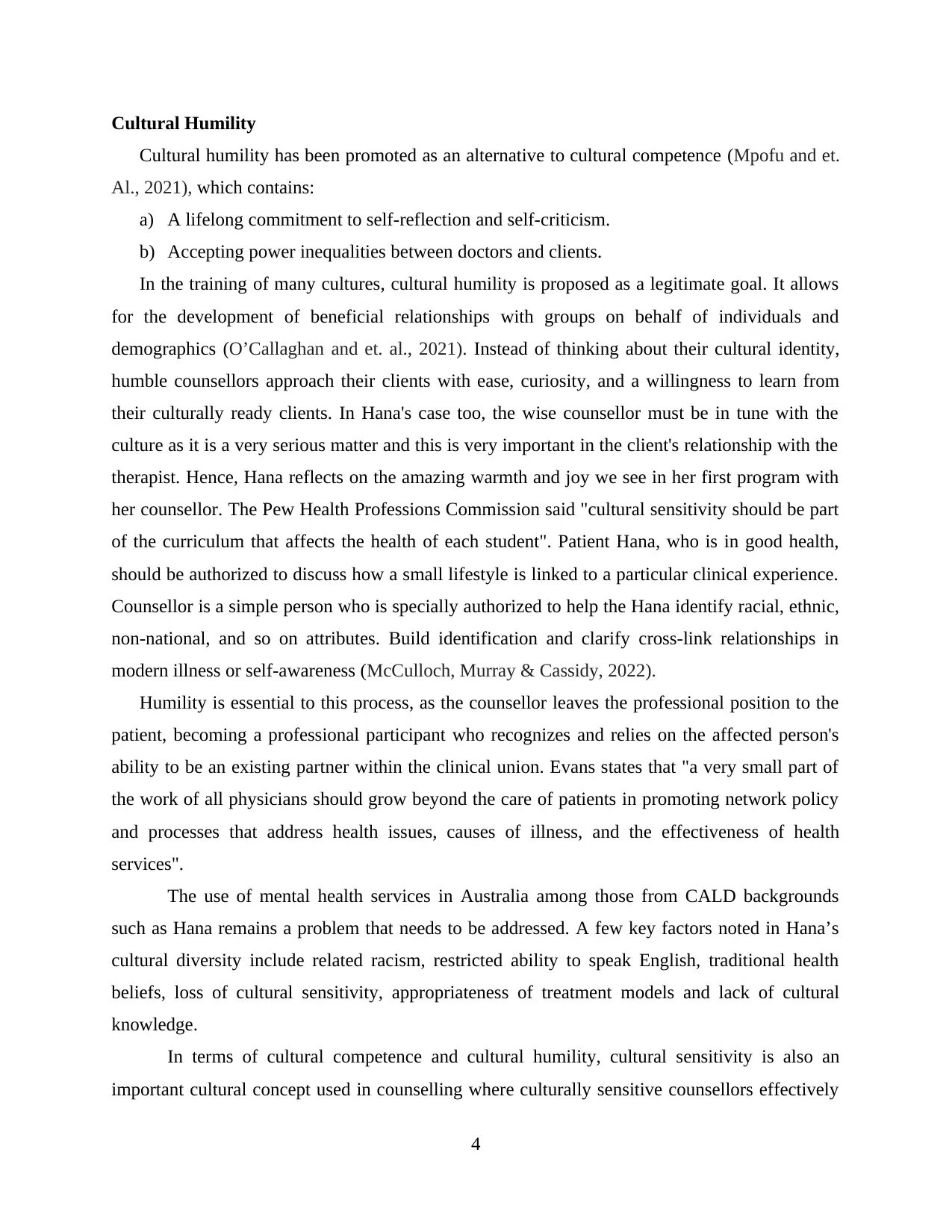
Cultural Humility
Cultural humility has been promoted as an alternative to cultural competence (Mpofu and et.
Al., 2021), which contains:
a) A lifelong commitment to self-reflection and self-criticism.
b) Accepting power inequalities between doctors and clients.
In the training of many cultures, cultural humility is proposed as a legitimate goal. It allows
for the development of beneficial relationships with groups on behalf of individuals and
demographics (O’Callaghan and et. al., 2021). Instead of thinking about their cultural identity,
humble counsellors approach their clients with ease, curiosity, and a willingness to learn from
their culturally ready clients. In Hana's case too, the wise counsellor must be in tune with the
culture as it is a very serious matter and this is very important in the client's relationship with the
therapist. Hence, Hana reflects on the amazing warmth and joy we see in her first program with
her counsellor. The Pew Health Professions Commission said "cultural sensitivity should be part
of the curriculum that affects the health of each student". Patient Hana, who is in good health,
should be authorized to discuss how a small lifestyle is linked to a particular clinical experience.
Counsellor is a simple person who is specially authorized to help the Hana identify racial, ethnic,
non-national, and so on attributes. Build identification and clarify cross-link relationships in
modern illness or self-awareness (McCulloch, Murray & Cassidy, 2022).
Humility is essential to this process, as the counsellor leaves the professional position to the
patient, becoming a professional participant who recognizes and relies on the affected person's
ability to be an existing partner within the clinical union. Evans states that "a very small part of
the work of all physicians should grow beyond the care of patients in promoting network policy
and processes that address health issues, causes of illness, and the effectiveness of health
services".
The use of mental health services in Australia among those from CALD backgrounds
such as Hana remains a problem that needs to be addressed. A few key factors noted in Hana’s
cultural diversity include related racism, restricted ability to speak English, traditional health
beliefs, loss of cultural sensitivity, appropriateness of treatment models and lack of cultural
knowledge.
In terms of cultural competence and cultural humility, cultural sensitivity is also an
important cultural concept used in counselling where culturally sensitive counsellors effectively
4
Cultural humility has been promoted as an alternative to cultural competence (Mpofu and et.
Al., 2021), which contains:
a) A lifelong commitment to self-reflection and self-criticism.
b) Accepting power inequalities between doctors and clients.
In the training of many cultures, cultural humility is proposed as a legitimate goal. It allows
for the development of beneficial relationships with groups on behalf of individuals and
demographics (O’Callaghan and et. al., 2021). Instead of thinking about their cultural identity,
humble counsellors approach their clients with ease, curiosity, and a willingness to learn from
their culturally ready clients. In Hana's case too, the wise counsellor must be in tune with the
culture as it is a very serious matter and this is very important in the client's relationship with the
therapist. Hence, Hana reflects on the amazing warmth and joy we see in her first program with
her counsellor. The Pew Health Professions Commission said "cultural sensitivity should be part
of the curriculum that affects the health of each student". Patient Hana, who is in good health,
should be authorized to discuss how a small lifestyle is linked to a particular clinical experience.
Counsellor is a simple person who is specially authorized to help the Hana identify racial, ethnic,
non-national, and so on attributes. Build identification and clarify cross-link relationships in
modern illness or self-awareness (McCulloch, Murray & Cassidy, 2022).
Humility is essential to this process, as the counsellor leaves the professional position to the
patient, becoming a professional participant who recognizes and relies on the affected person's
ability to be an existing partner within the clinical union. Evans states that "a very small part of
the work of all physicians should grow beyond the care of patients in promoting network policy
and processes that address health issues, causes of illness, and the effectiveness of health
services".
The use of mental health services in Australia among those from CALD backgrounds
such as Hana remains a problem that needs to be addressed. A few key factors noted in Hana’s
cultural diversity include related racism, restricted ability to speak English, traditional health
beliefs, loss of cultural sensitivity, appropriateness of treatment models and lack of cultural
knowledge.
In terms of cultural competence and cultural humility, cultural sensitivity is also an
important cultural concept used in counselling where culturally sensitive counsellors effectively
4
Paraphrase This Document
Need a fresh take? Get an instant paraphrase of this document with our AI Paraphraser
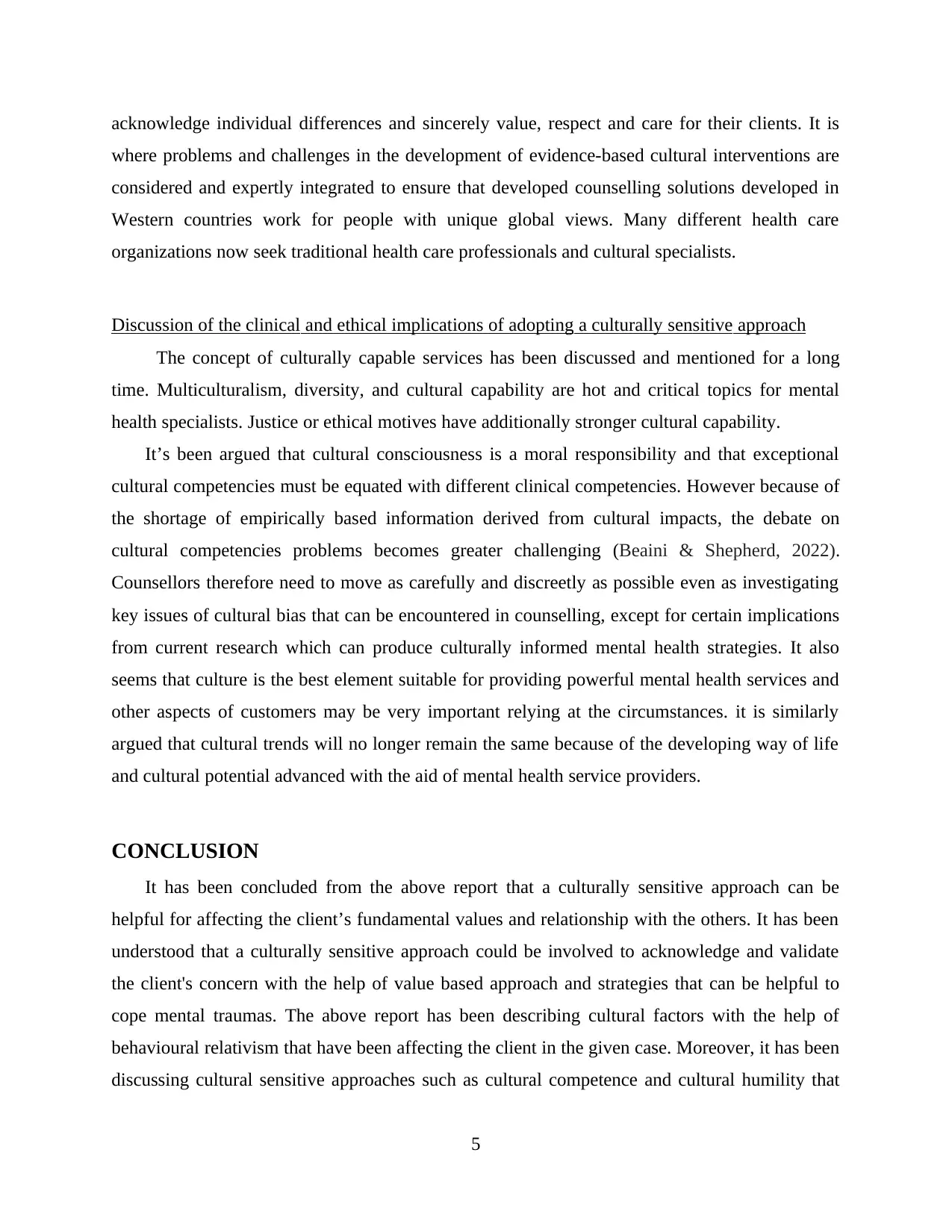
acknowledge individual differences and sincerely value, respect and care for their clients. It is
where problems and challenges in the development of evidence-based cultural interventions are
considered and expertly integrated to ensure that developed counselling solutions developed in
Western countries work for people with unique global views. Many different health care
organizations now seek traditional health care professionals and cultural specialists.
Discussion of the clinical and ethical implications of adopting a culturally sensitive approach
The concept of culturally capable services has been discussed and mentioned for a long
time. Multiculturalism, diversity, and cultural capability are hot and critical topics for mental
health specialists. Justice or ethical motives have additionally stronger cultural capability.
It’s been argued that cultural consciousness is a moral responsibility and that exceptional
cultural competencies must be equated with different clinical competencies. However because of
the shortage of empirically based information derived from cultural impacts, the debate on
cultural competencies problems becomes greater challenging (Beaini & Shepherd, 2022).
Counsellors therefore need to move as carefully and discreetly as possible even as investigating
key issues of cultural bias that can be encountered in counselling, except for certain implications
from current research which can produce culturally informed mental health strategies. It also
seems that culture is the best element suitable for providing powerful mental health services and
other aspects of customers may be very important relying at the circumstances. it is similarly
argued that cultural trends will no longer remain the same because of the developing way of life
and cultural potential advanced with the aid of mental health service providers.
CONCLUSION
It has been concluded from the above report that a culturally sensitive approach can be
helpful for affecting the client’s fundamental values and relationship with the others. It has been
understood that a culturally sensitive approach could be involved to acknowledge and validate
the client's concern with the help of value based approach and strategies that can be helpful to
cope mental traumas. The above report has been describing cultural factors with the help of
behavioural relativism that have been affecting the client in the given case. Moreover, it has been
discussing cultural sensitive approaches such as cultural competence and cultural humility that
5
where problems and challenges in the development of evidence-based cultural interventions are
considered and expertly integrated to ensure that developed counselling solutions developed in
Western countries work for people with unique global views. Many different health care
organizations now seek traditional health care professionals and cultural specialists.
Discussion of the clinical and ethical implications of adopting a culturally sensitive approach
The concept of culturally capable services has been discussed and mentioned for a long
time. Multiculturalism, diversity, and cultural capability are hot and critical topics for mental
health specialists. Justice or ethical motives have additionally stronger cultural capability.
It’s been argued that cultural consciousness is a moral responsibility and that exceptional
cultural competencies must be equated with different clinical competencies. However because of
the shortage of empirically based information derived from cultural impacts, the debate on
cultural competencies problems becomes greater challenging (Beaini & Shepherd, 2022).
Counsellors therefore need to move as carefully and discreetly as possible even as investigating
key issues of cultural bias that can be encountered in counselling, except for certain implications
from current research which can produce culturally informed mental health strategies. It also
seems that culture is the best element suitable for providing powerful mental health services and
other aspects of customers may be very important relying at the circumstances. it is similarly
argued that cultural trends will no longer remain the same because of the developing way of life
and cultural potential advanced with the aid of mental health service providers.
CONCLUSION
It has been concluded from the above report that a culturally sensitive approach can be
helpful for affecting the client’s fundamental values and relationship with the others. It has been
understood that a culturally sensitive approach could be involved to acknowledge and validate
the client's concern with the help of value based approach and strategies that can be helpful to
cope mental traumas. The above report has been describing cultural factors with the help of
behavioural relativism that have been affecting the client in the given case. Moreover, it has been
discussing cultural sensitive approaches such as cultural competence and cultural humility that
5
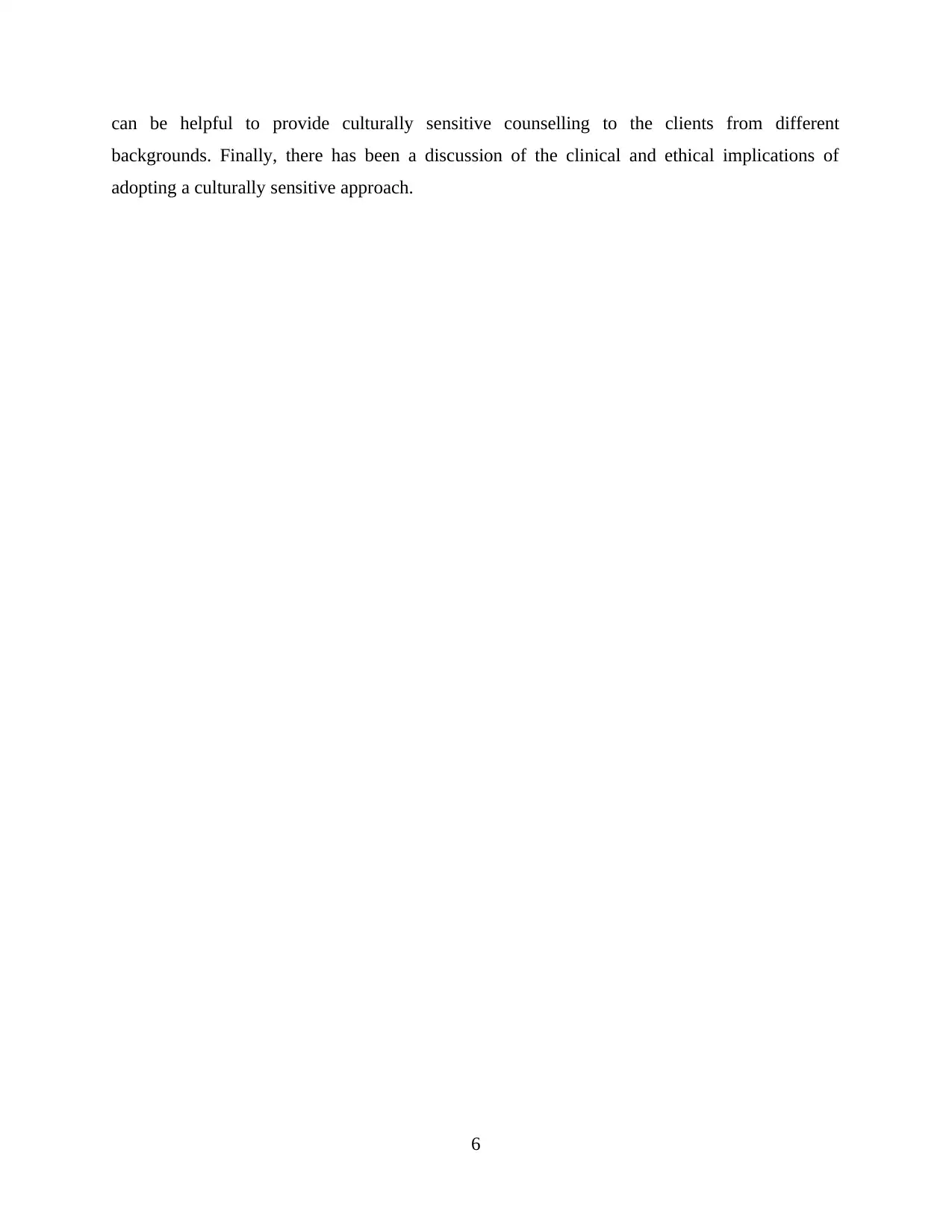
can be helpful to provide culturally sensitive counselling to the clients from different
backgrounds. Finally, there has been a discussion of the clinical and ethical implications of
adopting a culturally sensitive approach.
6
backgrounds. Finally, there has been a discussion of the clinical and ethical implications of
adopting a culturally sensitive approach.
6
⊘ This is a preview!⊘
Do you want full access?
Subscribe today to unlock all pages.

Trusted by 1+ million students worldwide
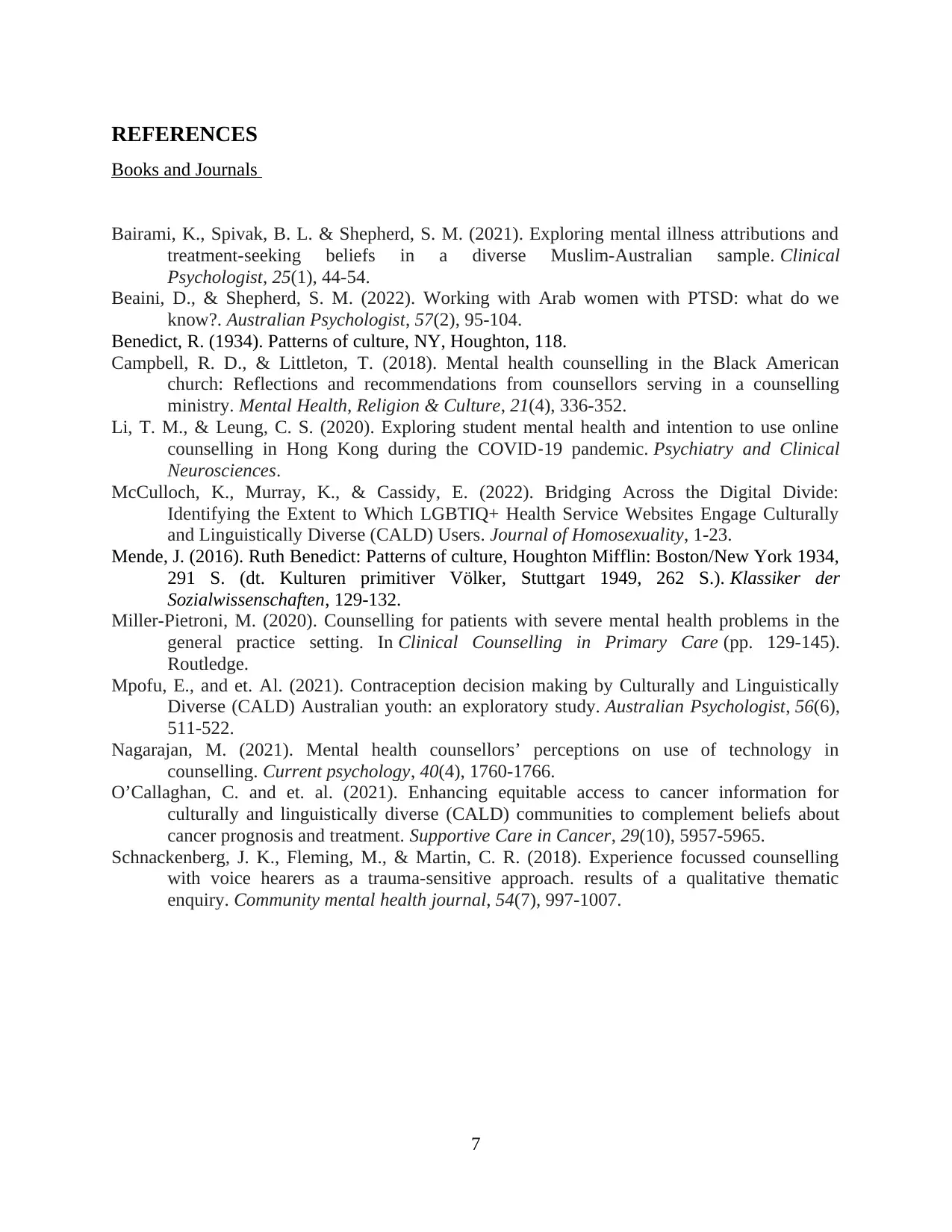
REFERENCES
Books and Journals
Bairami, K., Spivak, B. L. & Shepherd, S. M. (2021). Exploring mental illness attributions and
treatment-seeking beliefs in a diverse Muslim-Australian sample. Clinical
Psychologist, 25(1), 44-54.
Beaini, D., & Shepherd, S. M. (2022). Working with Arab women with PTSD: what do we
know?. Australian Psychologist, 57(2), 95-104.
Benedict, R. (1934). Patterns of culture, NY, Houghton, 118.
Campbell, R. D., & Littleton, T. (2018). Mental health counselling in the Black American
church: Reflections and recommendations from counsellors serving in a counselling
ministry. Mental Health, Religion & Culture, 21(4), 336-352.
Li, T. M., & Leung, C. S. (2020). Exploring student mental health and intention to use online
counselling in Hong Kong during the COVID‐19 pandemic. Psychiatry and Clinical
Neurosciences.
McCulloch, K., Murray, K., & Cassidy, E. (2022). Bridging Across the Digital Divide:
Identifying the Extent to Which LGBTIQ+ Health Service Websites Engage Culturally
and Linguistically Diverse (CALD) Users. Journal of Homosexuality, 1-23.
Mende, J. (2016). Ruth Benedict: Patterns of culture, Houghton Mifflin: Boston/New York 1934,
291 S. (dt. Kulturen primitiver Völker, Stuttgart 1949, 262 S.). Klassiker der
Sozialwissenschaften, 129-132.
Miller-Pietroni, M. (2020). Counselling for patients with severe mental health problems in the
general practice setting. In Clinical Counselling in Primary Care (pp. 129-145).
Routledge.
Mpofu, E., and et. Al. (2021). Contraception decision making by Culturally and Linguistically
Diverse (CALD) Australian youth: an exploratory study. Australian Psychologist, 56(6),
511-522.
Nagarajan, M. (2021). Mental health counsellors’ perceptions on use of technology in
counselling. Current psychology, 40(4), 1760-1766.
O’Callaghan, C. and et. al. (2021). Enhancing equitable access to cancer information for
culturally and linguistically diverse (CALD) communities to complement beliefs about
cancer prognosis and treatment. Supportive Care in Cancer, 29(10), 5957-5965.
Schnackenberg, J. K., Fleming, M., & Martin, C. R. (2018). Experience focussed counselling
with voice hearers as a trauma-sensitive approach. results of a qualitative thematic
enquiry. Community mental health journal, 54(7), 997-1007.
7
Books and Journals
Bairami, K., Spivak, B. L. & Shepherd, S. M. (2021). Exploring mental illness attributions and
treatment-seeking beliefs in a diverse Muslim-Australian sample. Clinical
Psychologist, 25(1), 44-54.
Beaini, D., & Shepherd, S. M. (2022). Working with Arab women with PTSD: what do we
know?. Australian Psychologist, 57(2), 95-104.
Benedict, R. (1934). Patterns of culture, NY, Houghton, 118.
Campbell, R. D., & Littleton, T. (2018). Mental health counselling in the Black American
church: Reflections and recommendations from counsellors serving in a counselling
ministry. Mental Health, Religion & Culture, 21(4), 336-352.
Li, T. M., & Leung, C. S. (2020). Exploring student mental health and intention to use online
counselling in Hong Kong during the COVID‐19 pandemic. Psychiatry and Clinical
Neurosciences.
McCulloch, K., Murray, K., & Cassidy, E. (2022). Bridging Across the Digital Divide:
Identifying the Extent to Which LGBTIQ+ Health Service Websites Engage Culturally
and Linguistically Diverse (CALD) Users. Journal of Homosexuality, 1-23.
Mende, J. (2016). Ruth Benedict: Patterns of culture, Houghton Mifflin: Boston/New York 1934,
291 S. (dt. Kulturen primitiver Völker, Stuttgart 1949, 262 S.). Klassiker der
Sozialwissenschaften, 129-132.
Miller-Pietroni, M. (2020). Counselling for patients with severe mental health problems in the
general practice setting. In Clinical Counselling in Primary Care (pp. 129-145).
Routledge.
Mpofu, E., and et. Al. (2021). Contraception decision making by Culturally and Linguistically
Diverse (CALD) Australian youth: an exploratory study. Australian Psychologist, 56(6),
511-522.
Nagarajan, M. (2021). Mental health counsellors’ perceptions on use of technology in
counselling. Current psychology, 40(4), 1760-1766.
O’Callaghan, C. and et. al. (2021). Enhancing equitable access to cancer information for
culturally and linguistically diverse (CALD) communities to complement beliefs about
cancer prognosis and treatment. Supportive Care in Cancer, 29(10), 5957-5965.
Schnackenberg, J. K., Fleming, M., & Martin, C. R. (2018). Experience focussed counselling
with voice hearers as a trauma-sensitive approach. results of a qualitative thematic
enquiry. Community mental health journal, 54(7), 997-1007.
7
1 out of 10
Related Documents
Your All-in-One AI-Powered Toolkit for Academic Success.
+13062052269
info@desklib.com
Available 24*7 on WhatsApp / Email
![[object Object]](/_next/static/media/star-bottom.7253800d.svg)
Unlock your academic potential
Copyright © 2020–2026 A2Z Services. All Rights Reserved. Developed and managed by ZUCOL.





